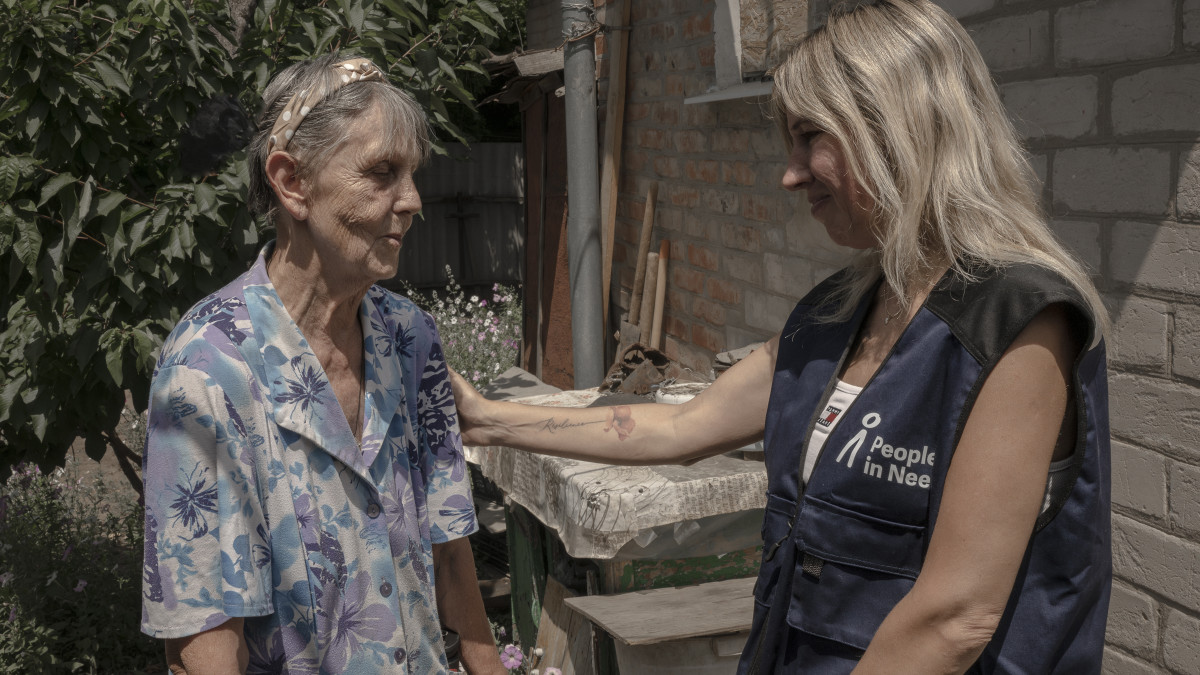On the frontlines of humanitarian aid
Published: Aug 18, 2025 Reading time: 4 minutes Share: Share an articleAugust 19 – World Humanitarian Day. On this day, people around the world thank those who—often at great risk—help others. Russia’s war in Ukraine has created an complex humanitarian situation in the country. Yet, from the very first days of the war, volunteers and humanitarian workers became a vital life-line for those affected. Thanks to our colleagues and partners, we have been able to support Ukrainian people since day-one, and on World Humanitarian Day, we want to share the stories of our colleagues who go out every day, despite danger, to help those who need us.

It was one of the most terrifying nights for the residents of Nedryhailiv in Sumy Oblast since the start of the war. The village was attacked by drones at night. Powerful explosions damaged more than twenty homes. The ground is still blackened by fire, and houses stand without roofs or windows. Our colleagues immediately went to assess the damage and assist with repairs, including coordinator Dmytro Yanchuk.
Dmytro’s journey in the humanitarian sector began in the first days of the war. He started as a volunteer and later joined our team:
“After the full-scale invasion, I realised I wanted to be useful. But I wanted to help not alone, but as part of a coordinated team, so that our impact would be real. Humanitarian principles guide me in both work and life,” Dmytro explains.
Dmytro and his colleagues inspect a damaged home. Fire destroyed outbuildings with livestock and spread to the roof. Oleksii and his family miraculously survived the nighttime attack.
“We were asleep when we heard a loud explosion. The windows shattered and glass scattered everywhere. We ran to the yard with the whole family. In the room where the load-bearing wall cracked, my father was lying. We carried him out and took him to safety,” recounts Oleksii.
Of all Ukrain’s Oblasts, Sumy shares the longest border with Russia. In recent months, the situation has been extremely tense—constant shelling, evacuations, living under the sounds of explosions. People often leave their homes with only their most valuable belongings.
“Some carry dishes, some a cat or a chicken; they are told they can’t take the chicken to the transit centre. People are in shock, but they take what is important to them to keep living. It’s very touching and at the same time heartbreaking,” Dmytro shares.
Whenever aid needs to be delivered to border communities, we keep body and helmets ready. A first-aid kit is mandatory for field trips. Despite the risks, Dmytro has never regretted his choice:
“It’s very important for me to see the results of my work, especially those that change entire communities. For example, when we restore a central heating facility, people have warmth and hot water. That’s a huge impact.”
Inna Ierofieieva knows from personal experience what it feels like to lose a home because of war. In 2014, she and her family moved from occupied Horlivka to Bakhmut. Receiving help from us, Inna learned that we were hiring. Today, she is an Area Manager in Donetsk and Zaporizhzhia oblasts.
The situation in these frontline regions remains extremely challenging, and we work to respond quickly to the growing humanitarian needs.
“Long ago, I was caught in a sudden attack at a checkpoint, but after that, I had no triggers preventing me from going to frontline locations. I understand our work involves risk. But hundreds of people are waiting for our help. And we can’t abandon them.”
Every day, Inna hears the stories of people whose lives have been shattered by the war. One case in Kramatorsk left a strong impression:
“The team was registering residents for assistance, and a social worker brought a lonely elderly man. He was barefoot, in dirty clothes, without documents. It turned out he had just been evacuated from shelling. He didn’t understand what was happening, he was disoriented,” recalls Inna.
Beyond registering people and distributing aid, Inna also act as a psychologist—listening to and supporting those affected. Even when requests go beyond our work, she finds ways to help.
Now, as a manager, Inna spends more time in the office. Yet she keeps a sense of direct contact with people—she asks hotline operators to send not only questions and comments but also words of thanks from those the team had assisted:
“Sometimes reading them brings tears to your eyes. It motivates not only me but the whole team.”
We support people during the most difficult moments of their lives—in frontline communities and across Ukraine. On World Humanitarian Day, we emphasise that protecting civilians and ensuring the safety of humanitarian workers must remain a global priority.



